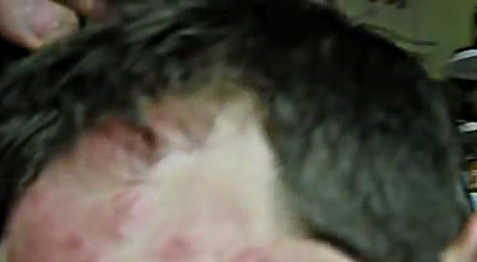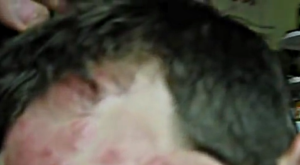Shingles is a viral disease that compromises the nerve pathway. It is also known as herpes zoster and is caused by a virus known as Varicella Zoster, which is also the virus which causes chicken pox. Shingles are extremely painful especially when they occur on the scalp. Blisters filled with fluid develop on the scalp and they are very itchy and painful. The skin on the scalp becomes sensitive to the touch, and one cannot even groom the hair since even the slightest touch from the comb causes pain. If not treated in time, shingles on the scalp can leave permanent bald patches on the head, and this can be life-altering.
Shingles on Scalp – Symptoms
The nerves that run along and serve the scalp are the ones involved in shingles on the scalp. The disease starts off with chills, malaise and mild fever, and one may think that he or she is developing the flu. At the start the scalp will be slightly sensitive to the touch, and one may experience mild to moderate headaches. After 4 or 5 days, there will be a sudden development of small blisters on the scalp.
The blisters will form on one side of the scalp, alongside the nerve that the virus has infected; the blisters will be filled with a clear fluid. After their first appearance, the blisters will start to dry and scab after 5 days. The patient now experiences irresistible itching and a lot of pain; the pain will make it impossible to comb the hair. When scratched, the blisters will burst and this will lead to the formation of scar tissue.
When one gets shingles on the scalp, the development of scar tissue may lead to permanent bald patches on the head. This is because the hair follicles are destroyed completely and the hair loss is permanent. There are rare cases where some patients have developed inflammation of the brain, or encephalitis, due to shingles on the scalp. Encephalitis will manifest as severe headaches, confusion, lethargy, irritability, weakness of the muscles, etc.
Causes
Shingles on scalp is caused by the herpes zoster virus which also causes chicken pox. Shingles on scalp can develop at any time, but is most common in people over the age of 50. If you have chickenpox and you recover, the virus lays dormant in the nerve roots of the spine, and is never killed. The virus becomes reactivated when the conditions are suitable.
The virus then passes through nerves that serve the skin, which causes acute inflammation of these nerves. Mostly, only the sensory nerves are affected. Shingles will mostly affect the back, the front of the chest, the face and thighs; occasionally, the virus can affect the eyes and scalp.
The reason why the virus becomes active again is not yet fully understood. However, it is known to occur when the immune system is weakened. There are conditions and situations that may weaken the immune system, such as stress, diseases such as cancer, radio therapy; one must also note that the immune system becomes weaker with age.
Treatment (Home Remedies) for shingles on scalp
The treatment of shingles on scalp should be done promptly and carefully to reduces the itching and the pain. It is important that you follow a good hair regimen so you do not get any scarring which will lead to permanent hair loss.
- Use an antiviral medication such as Acyclovir, which will stop the inflammation faster, reduce the period of the disease, and also decrease the chances of developing post herpetic neuralgia.
- Get plenty of rest so the body can recover from this viral disease faster.
- When the itching starts, you can use a cold compress to numb the area and reduce the itching.
- You should use calamine lotion to reduce the itching
- Instead of taking a hot shower, take a cold one instead. You should wash the hair carefully, and do not scrub it; wash it gently using your fingertips. You should also avoid all scented soaps and shampoos.
- Comb your hair very carefully using a soft bristle comb which will not affect the blisters; this will ensure that no scarring takes place.
- You should eat a lot of fruits and vegetables in order to stimulate the immune system. You can also mix orange juice with honey; this particular mix has been found to be useful in the reduction of the symptoms of herpes zoster.
Shingles on scalp is a very sensitive disease and can have lasting effects on someone’s personality. When you have patches of bald hair, especially in your youth, it will affect how you relate socially and professionally. You should follow the steps spelt out to manage the disease and ensure that you do not get scar tissue which will lead to permanent hair loss.

